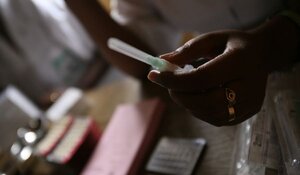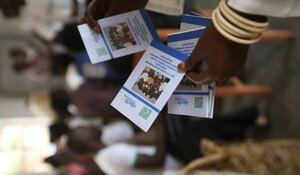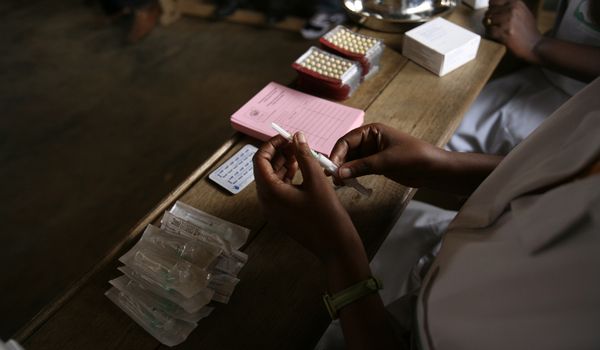I would like to start with a brief general overview of the situation in Rwanda regarding COVID-19. Interestingly enough, Rwanda is the only African country with no Corona-related travel-ban into Austria. How is Rwanda coping with the COVID-19 crisis?
Indeed, Rwanda has the privilege of being one of the countries that is allowed to travel to other countries, especially to Europe. The country immediately went into lock-down after the first few cases in April. There were guidelines put in place about only moving when it is absolutely needed. Currently there is still restricted movement, especially in Kigali. We have a curfew put in place, you have to be home at 7 pm and if you are caught outside there are detention centers where people are taken to spend the night or even a few days as punishment. Schools are still closed. Participants of meetings, conferences or weddings are supposed to bring tests of COVID-19. So, this has made our work difficult, especially for Civil Society Organizations’ (CSOs) activities like trainings and meetings.
How did COVID-19 effect the sexual and reproductive health and rights (SRHR) of women and girls in Rwanda?
The entire situation has definitely affected SRHR. Our main worry is that our services focus on COVID-19, so we are losing sight of other health issues that people might be having. There is an increased risk of teenage pregnancy, as youths are not going to school. The negative impacts on SRHR are also related to poverty and economic stress. In Rwanda we have a general health insurance where households that can afford it contribute themselves a fair amount to health services for everyone. For poor people, who can’t afford this, the government usually covers the insurance. But as things become strained, more families are not able to afford the insurance fees and the government might face challenges of not being able to cover healthcare for everyone. As people experience economic hardships, they are forced to focus on basic needs like food and water, and ignore other needs which are not immediate, for example, materials for menstrual hygiene. We also have systemic barriers caused by religion, especially because in Rwanda we have many health centers run by faith-based organizations. When they don’t offer SRHR services, particularly abortion care, then this requires women and girls to move to other places. But now, with limitations on movement, this affects the access to alternative clinics.

How is the access to and affordability of contraceptives in general in Rwanda and during the lockdown?
The access to contraceptives is not an issue of cost, except for the morning after pill, which is very expensive. Other contraceptives and accompanying services are part of the package people can access from health services for free. The challenges are that many people don’t visit health centers regularly to get advice, health personnel has to take care of too many patients and the perceptions and norms of the use of birth control by young people. Teenage pregnancies have been a problem before, and the problem is getting worse. We are not yet at a point where we are facing this realistically and getting out of abstinence-only messages and looking at other mechanisms that could help youth manage their sexuality. Both the government and civil society should address these misperceptions.
What do you think are the greatest challenges, especially for Rwandan women and girls with regard to SRHR and especially with regard to the implications of COVID-19?
I think we need to invest in inclusive recovery plans. We need to make sure that vulnerable groups are being consulted or invoked: people with disabilities, young women, youth. There was very limited participation of civil society in general and women and girls in particular. Local officials and service providers need to be aware and sensitive to women’s and girls’ unique needs during a crisis. I demand gender audits of the recovery strategies, which can help us being able to monitor and hold our governments and other institutions accountable. We would also like to see more consideration of women and young people in the economic recovery plan. Emergency assistance including women’s and girls’ health and rights, like menstrual hygiene materials and relevant information needs to be increased.
COVID-19 made systematic injustices, such as the distribution of paid and unpaid work, regarding care work, more visible. Some feminist activists also see COVID-19 as window of opportunity to introduce system change and reinforce gender justice. From your point of view as a feminist and long-term gender development expert, how would a feminist post-Corona response on a global scale look like?
Unfortunately change takes a long time. But I would want to see is a world where both women and men, boys and girls are effective citizens, their rights are being respected, care work is being distributed equally or fairly in the home; men helping with children and with other care work, but also learn how to better deal with stress and frustration, and not to take it out on their partners, family members and children. We also see trauma when people are unable to provide for their families. People in Rwanda experienced stress from different sides, the lockdown found us in the commemoration time of the Tutsi genocide, and people were really missing out on the solidarity and support, the discussions and the conversations on how to deal with that. So, we need to integrate an understanding and local strategies of self-care, collective care and mental health into everyday life.

In November 2020, there will be the “Ubuntu Symposium” – the Men Engage Conference in Kigali. How do you think transforming masculinities supports gender and social justice?
My former employer, the Rwanda Women’s Network is a member of the MenEngage Network. For women’s organizations it is key to be in such networks, because we have acknowledged that engaging men and boys is important for easing the process of change and sustaining the change. And as organizations and feminists, we want to learn how to ensure that feminist approaches and values are integrated in the work with men and boys and how positive masculinities are promoted.
But, as a feminist person, I wonder to what extent would I like to call men’s organisations, to what extent are they genuine? Are they ready for this work, because it requires you to change as an individual, before you start changing others? To what extent are they practicing feminist values, feminist principles? Are they coming in with the idea of “rescuing” women? Or are they coming in as people who are humble and ready to learn? Yet, I would like to see patriarchy dismantled and men and boys are at the center of this. Working with them and being with them on this journey makes life easier and change rather becomes a reality when they are involved.
What can the Global North do to support women and girls and their access to SRHR in Rwanda?
For the COVID-19 crisis to be managed, we have to act in solidarity, because it’s affecting all of us. Anything happening in one country affects the others. I am seeing collaboration with the North, especially stakeholders and governments, supporting our work in relation to investing in reducing the economic effects of COVID on women and girls, because whatever happens to economic stability or the economic situations of women and girls definitely affects SRHR.
We also need to address the increased risk of teenage pregnancy, school dropouts and forced marriage. This has been an existing, yet silenced problem in Rwanda. Now is an opportunity to invest further, challenge existing norms, see what mechanisms can work, start to give out information, provide youth-friendly services and disseminate information on safe, legal abortion. Projects related to that could be supported.
Also, supporting CSOs in conducting the monitoring of any recovery activities, particularly regarding gender inclusiveness, and in strengthening health and education systems.
The last one is to tackle and promote positive masculinities, and engaging men to contribute to underpaid care work, for all members of the family to be effective and productive contributors to the welfare of the family (1 September 2020).

